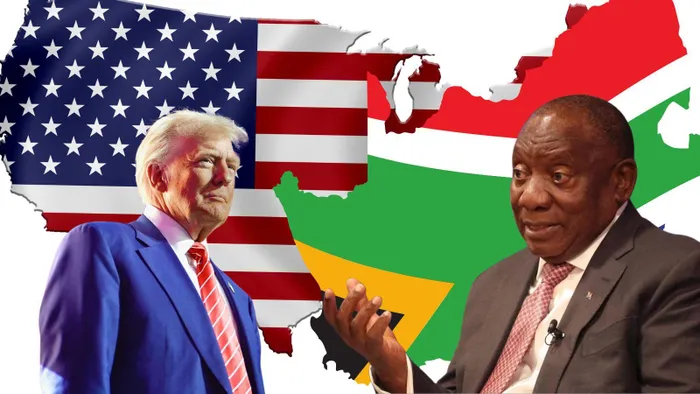Ramaphosa’s US visit sparks outrage: “A Trip Organised by White Capital”
Oval Office Talks

President Cyril Ramaphosa is accused of compromising national sovereignty under pressure from US President Donald Trump and tech billionaire Elon Musk.
Image: Se-Anne Rall
President Cyril Ramaphosa’s recent visit to the United States has ignited a political firestorm in South Africa, with critics accusing him of compromising national sovereignty under pressure from US President Donald Trump and tech billionaire Elon Musk.
Ramaphosa met Trump yesterday at Trumps’s office, also called the Oval Office. What was framed by the presidency as a diplomatic mission to "reset the strategic relationship" between South Africa and the US is now being described by many as an ill-advised tour orchestrated by powerful white capital interests, chief among them, Musk and South African billionaire Johan Rupert.
At the centre of the controversy is the potential entry of Musk’s Starlink satellite internet service into the South African market.
Sources suggest that Ramaphosa is preparing to greenlight the move, potentially circumventing Black Economic Empowerment (BEE) legislation, which requires at least 30% local ownership by historically disadvantaged South Africans. Such a concession would mark a dramatic shift in South Africa’s policy stance, and critics see it as a rollback of hard-won gains in economic transformation.
The visit, which included a high-profile meeting at the White House with Trump, came amid heightened tensions. Trump has openly attacked South Africa's land reform policies, alleging that white farmers were being violently dispossessed, a claim that has been widely debunked as part of a global disinformation campaign.
Adding to tensions is South Africa's case against Israel, wherein the International Court of Justice found that Israel was guilty of genocide in Gaza.“This was cowardice,” said one political commentator in Johannesburg.
“Cyril going to the Oval Office like that? After everything Trump and Musk have said about South Africa? They know there’s no white genocide. They’re using that lie to punish us for holding Netanyahu accountable at the ICJ. If they can treat a NATO-backed president like Zelensky with disdain, what hope does Ramaphosa have?”
Though Ramaphosa, speaking in Washington, insisted that South Africa remains a “sovereign country” and would “always do what's best for South Africans,” many say his actions have contradicted his words.
Ramaphosa’s private phone call to Musk to discuss concerns about the Expropriation Bill was seen as bypassing both government protocol and principle. The EFF and other opposition voices have condemned the call as ceding undue influence to a foreign billionaire uninterested in South Africa’s developmental or historical context.
In public remarks, Ramaphosa appeared eager to project confidence: “We’re hoping to have a really good discussion with President Trump and his fellow government colleagues. We're looking for a good outcome for our country, our people, jobs, and good trade relations.” However, back home, the optics of the trip — handshakes with Trump, quiet reassurances to Musk — were viewed with suspicion.
Political analyst Theo Venter noted that allowing Starlink into the South African market could open the door for broader investment by Musk, including ventures in energy and transport. But he warned that such deals must be approached with caution. “It’s one thing to invite innovation,” said Venter, “but it’s another to invite control.
If we gut our laws to please investors, we are no longer setting the terms of engagement—we’re accepting them.”
Supporters of the Starlink initiative argue that the service could significantly improve internet access in rural South Africa, boosting education, entrepreneurship, and communication.
The broader concern is whether this will come at the cost of empowerment, transformation, and the country's post-apartheid vision.